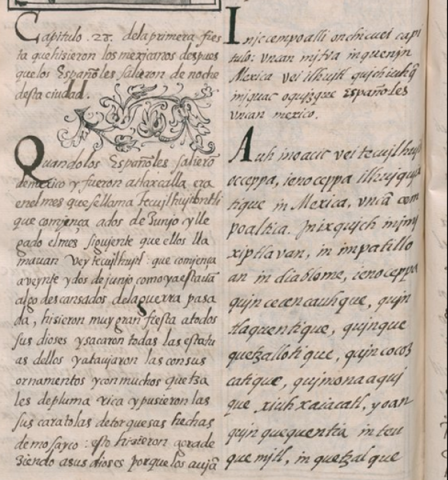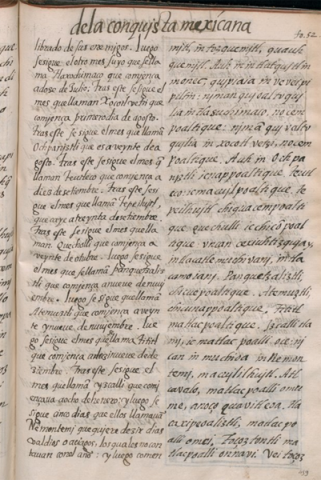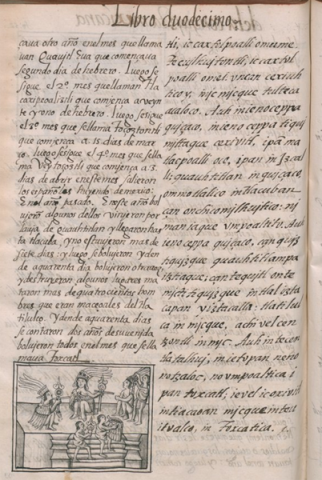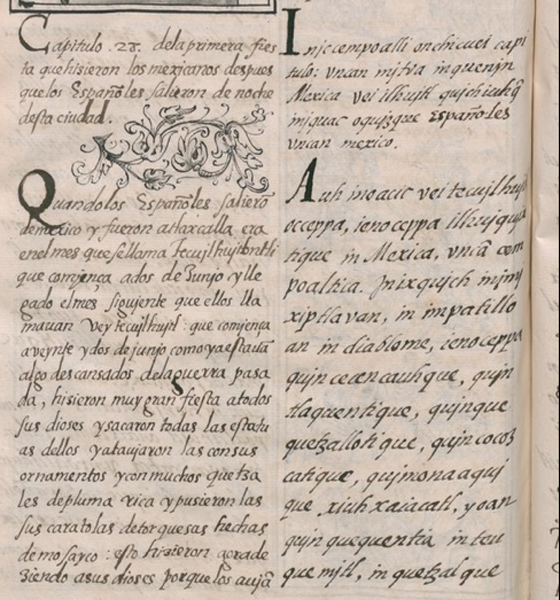 |
[Transcription of the Nahuatl (right-hand column) by James Lockhart:]
[f. 51v., cont.] Inic cempoalli onchicuei capitulo: vncan mitoa in quenin Mexica vei ilhuitl quichiuhq̄ in iquac oquizque Españoles vncan mexico.
Auh in oacic vei tecuilhuitl: oc ceppa, ie no ceppa ilhuiquixtique in Mexica, vncā cempoaltica. In ixquich inimixiptlavan, in impatilloan in diablome, ie no ceppaquincecencauhque, quintlaquentique, quinquequetzallotique, quincocozcatique, quimonaaquique xiuhxaiacatl, yoan quinquequentia in teuquemitl, in quetzalqu
|
[Translation of the Nahuatl (right-hand column) by James Lockhart:]
Twenty-eighth chapter, where it is said how the Mexica celebrated a great festivity when the Spaniards left Mexico.
And when Huei teucilhuitl arrived, again, once again the Mexica celebrated a feast day, on the twentieth day. Again they ornamented and clothed all the images and representations of the devils. On each of them they placed precious feathers, necklaces, and turquoise masks, and they dressed them in gods’ garments, quetzal feather garments,
[Translation of the Spanish (left-hand column) by James Lockhart:]
Chapter Twenty-eight, of the first festivity that the Mexica celebrated after the Spaniards left this city by night.
When the Spaniards left Mexico and went to Tlaxcala, it was the month called Teucilhuitondi, which begins on the second of June. When the following month, which they call Huei teucilhuitl, beginning the twenty-second of June, had come, now that they were somewhat rested from the past war, they celebrated a very great festivity for all of their gods. They took out all their statues of them and decorated them with their ornaments and with many quetzales of rich feathers, and put on them their masks of turquoise mosaic. They did this in gratitude to their gods for having
|
[Translation of the Nahuatl into Spanish by Fr. Bernardino de Sahagún; transcription of the Spanish (left-hand column) by James Lockhart:]
[f. 51v., cont.] Capitulo .28. de la primera fiesta que hizieron los mexicanos despues que los Españoles salieron de noche desta ciudad.
Quando los Españoles salierō de mexico y fueron a tlaxcalla era en el mes que se llama Tecuilhuitontli que comiença a dosde Junio y llegado el mes siguiente que ellos llamauan Vey tecuilhuitl: que comiença a veynte y dos de junio como ya estauā algo descansados de la guerra pasada, hizieron muy gran fiesta a todos sus dioses y sacaron todas las estatuas dellos y atauiaronlas con sus ornamentos y con muchos quetzales de pluma rica y pusieronlas sus caratolas de torquesas hechas de mosayco: esto hizieron agradeziendo a sus dioses porque los auiā
|
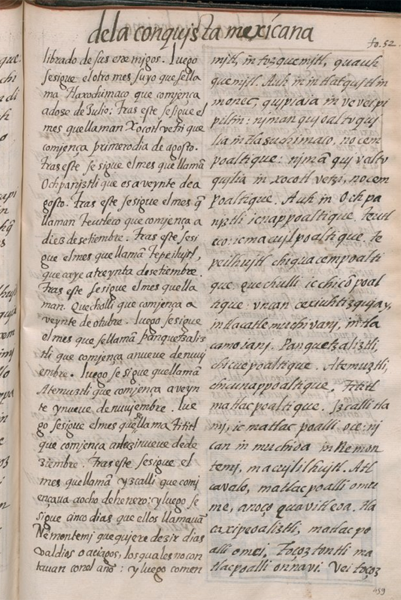 |
[Transcription of the Nahuatl (right-hand column) by James Lockhart:]
[f. 52r.] mitl, in tozquemitl, quauhquemitl. Auh inin tlatquitl inmonec, quipiaia in vevei pipiltin:
niman quioaltoquilia in Tlasuchimaco, no cempoaltique: nimā quivaltoquilia in xocotl vetzi, no cempoaltique. Auh in Ochpaniztli ic nappoaltique. Teutl eco: icmacuilpoaltique. Tepeilhuitl chiquacempoaltique. Quechulli ic chicōpoaltique: vncan cexiuhtizquia y, intlacatle muchivani, intlacamo iani. Panquetzaliztli, chicuepoaltique. Atemuztli, chicunappoaltique. Tititl matlacpoaltique. Izcalli tlami, ic matlacpoalli oce: nican in muchioa in Nemontemi, macuililhuitl. Atl cavalo, matlacpoalli omume, anoço Quavitl eoa. Tlacaxipeoaliztli, matlacpoalli omei. Toçoztontli matlacpoalli onnavi. Vei toçoz
|
[Translation of the Nahuatl (right-hand column) by James Lockhart:]
yellow parrot feather garments, eagle feather garments. And the great noblemen kept all this gear that was used.
Then followed Tlaxochimaco, during which they also spent twenty days; then followed Xocotl huetzi, also twenty days. And with Ochpaniztli they spent the fourth twenty; with Teotl eco the fifth twenty; Tepeilhuitl the sixth; Quecholli the seventh. At this point [the Spaniards] would have spent a year if nothing had happened and they had not gone away. Panquetzaliztli was the eighth; Atemoztli, the ninth; Tititl, the tenth; Izcalli, the end, the eleventh; here Nemontemi took place, five days. Atl cahualo or Quahuitl ehua, the twelfth; Tlacaxipehualiztli, the thirteenth; Toçoztontli, the fourteenth; Huei toçoztli,
[Translation of the Spanish (left-hand column) by James Lockhart:]
freed them from their enemies.
Then follows another month, called Tlaxochimaco, beginning the twelfth of July; after this follows the month they call Xocotl huetzi, beginning the first day of August. After this follows the month they call Ochpaniztli, on the twentieth of August; after this follows the month they call Teotl eco, beginning the tenth of September. After this follows the month they call Tepeilhuitl, which falls on the thirtieth of September. After this follows the month they call Quecholli, beginning the twentieth of October. Then follows the month they call Panquetzaliztli, beginning the ninth of November. Then follows [the month] they call Atemoztli, beginning the twenty-ninth of November. Then follows the month called Tititl, beginning the nineteenth of December. After this follows the month they call Izcalli, which would begin the eighth of January; and then follow five days that they called Nemontemi, meaning useless or unlucky days, which they do not count with the year. Then began
|
[Translation of the Nahuatl into Spanish by Fr. Bernardino de Sahagún; transcription of the Spanish (left-hand column) by James Lockhart:]
[f. 52r.] librado de sus enemigos.
Luego se sigue el otro mes suyo que se llama Tlaxochimaco que comiença a doze de Julio: Tras este se sigue el mes que llaman Xocotl vetzi que comiença primero dia de agosto. Tras este se sigue el mes que llamā Ochpaniztli que es a veynte de agosto. Tras este se sigue el mes q̄ llaman Teutleco que comiença a diez de setiembre. Tras este se sigue el mes que llamā Tepeiluitl, que caye a treynta de setiembre. Tras este se sigue el mes que llaman. Quecholli que comiença a veynte de otubre. Luego se sigue el mes que se llamā Panquetzaliztli que comiença a nueue de nuuiembre. Luego se sigue que llamā Atemuztli que comiença a veynte y nueue de nuuiembre. Luego se sigue el mes que se llama Tititl que comiença a diezinueue de deziembre. Tras este se sigue el mes que llamā yzcalli que comiençaua* a ocho de henero: y luego se sigue cinco dias que ellos llamauā Nemontemi que quiere dezir dias valdios o aciagos, los quales no contauan con el año: y luego comen
----------
*COMIENÇAUA. For standard "començaua."
|
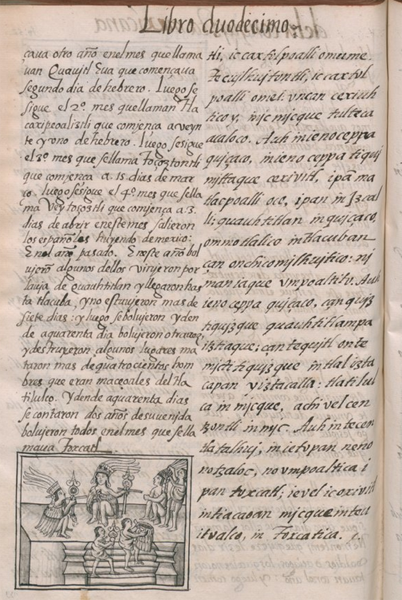 |
[Transcription of the Nahuatl (right-hand column) by James Lockhart:]
[f. 52v.] tli, ic caxtolpoalli omume.* Tecuilhuitontli, ic caxtolpoalli omei: vncan cexiuhtico y, inic micque tultecaacaloco.
Auh in ie no ceppa quiçaco, in ie no ceppa tiquimittaque ce xivitl, ipā matlacpoalli oce, ipan in Izcalli: quauhtitlan in quiçaco, ommotlalico in Tlacuban çanonchicomilhuitico: niman iaque vmpoaltito. Auh ie noceppa quiçaco, çan quiztiquizque quauhtitlampa itztiaque: çan tequitl ontemictitiquizque in tlaliztacapan yiztacalla: tlatilulca in micque, achi vel centzontli in mic.
Auh in tecentlatalhui, in ie topan nenonotzaloc, no vmpoaltica ipan toxcatl: ie vel ic oxivitl in tiacacoan micque in teuitvalco, in Toxcatica./.
----------
*IC CAXTOLPOALLI OMUME. "Seventeenth" is correct; two months are omitted on the list.
|
[Translation of the Nahuatl (right-hand column) by James Lockhart:]
the seventeenth; Teucilhuitontli, the eighteenth. At this point a year had passed since [the Spaniards] had died at the Tolteca canal.
And when they appeared again, when we saw them again, in Izcalli, it had been a year and eleven twenties [since they left]. It was at Quauhtitlan that they appeared; they made a halt at Tlacopan, where they stayed only seven days, then they went away for forty days. When they appeared again, they only came by quickly, going in the direction of Quauhtitlan. All they did was kill some people in passing at Tlaliztacapan and Iztaccalla; those who died were Tlatelolca; close to four hundred died.
And when they had had full discussions and consultations about [their plans for] us, it was another forty days, in Toxcatl, with which it had been fully two years since the warriors died in Toxcatl in the temple courtyard.
[Translation of the Spanish (left-hand column) by James Lockhart:]
another year with the month they called Quahuitl ehua, which began the second day of February. Then follows the second month, which they call Tlacaxipehualiztli, beginning the twenty-first of February; then follows the third month, called Toçoztontli, which begins the fifteenth day of March; then follows the fourth month, called Huei toçoztli, which begins the third day of April. It was in this month [sic] that the Spaniards left Mexico fleeing, the year before.
In this year some of them returned, coming by way of Quauhtitlan, and reached Tacuba [Tlacopan]. They were there only seven days; then they went back, but after forty days they returned again and destroyed some settlements, killing more than four hundred men who were macehuales of Tlatelolco. Forty days after that, it had been two years since they came. They all returned in the month called Toxcatl.
|
[Translation of the Nahuatl into Spanish by Fr. Bernardino de Sahagún; transcription of the Spanish (left-hand column) by James Lockhart:]
[f. 52v.] çaua otro año en el mes que llamauan Quauitl Eua que començaua segundo dia de hebrero. Luego se sigue el 2ọ mes que llaman Tlacaxipeoaliztli que comiença a veynte y vno de hebrero. Luego se sigue el 3ọ mes que se llama Toçoztontli que comiença a .15. dias de março. Luego se sigue el 4o. mes que se llama Vey toçoztli que comiença a .3. dias de abrir en este mes salieron los españoles huyendo de mexico: En el año pasado.
En este año boluierō algunos dellos vinieron por la uia de Quauhtitlan y llegaron hasta tlacuba, y no estuuieron mas de siete dias: y luego se boluieron y dende a quarenta dia boluieron otra uez, y destruyeron algunos lugares mataron mas de quatrocientos hombres que eran maceoales del Tlatilulco. Y dende a quarenta dias se contaron dos años de su uenida boluieron todos en el mes que se llamaua Toxcatl.
|
